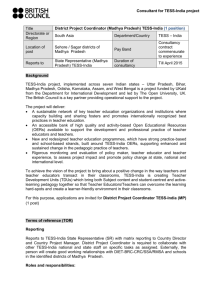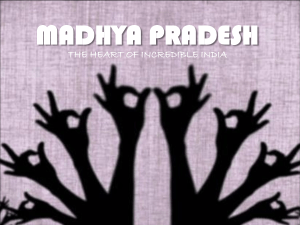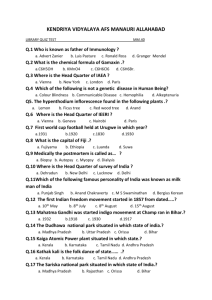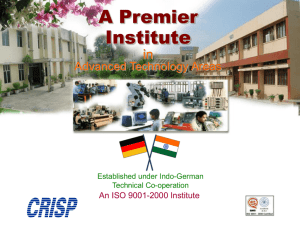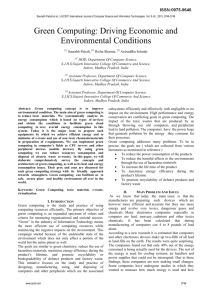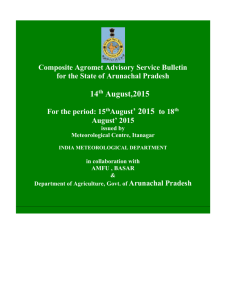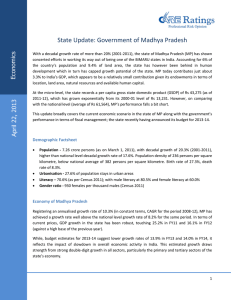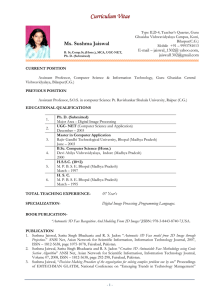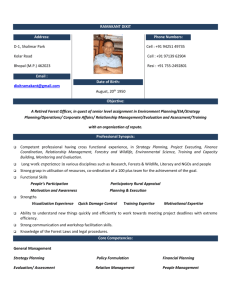PUBLIC ADMINISTRATION ( CODE NO. 18) PAPER – I PART
advertisement
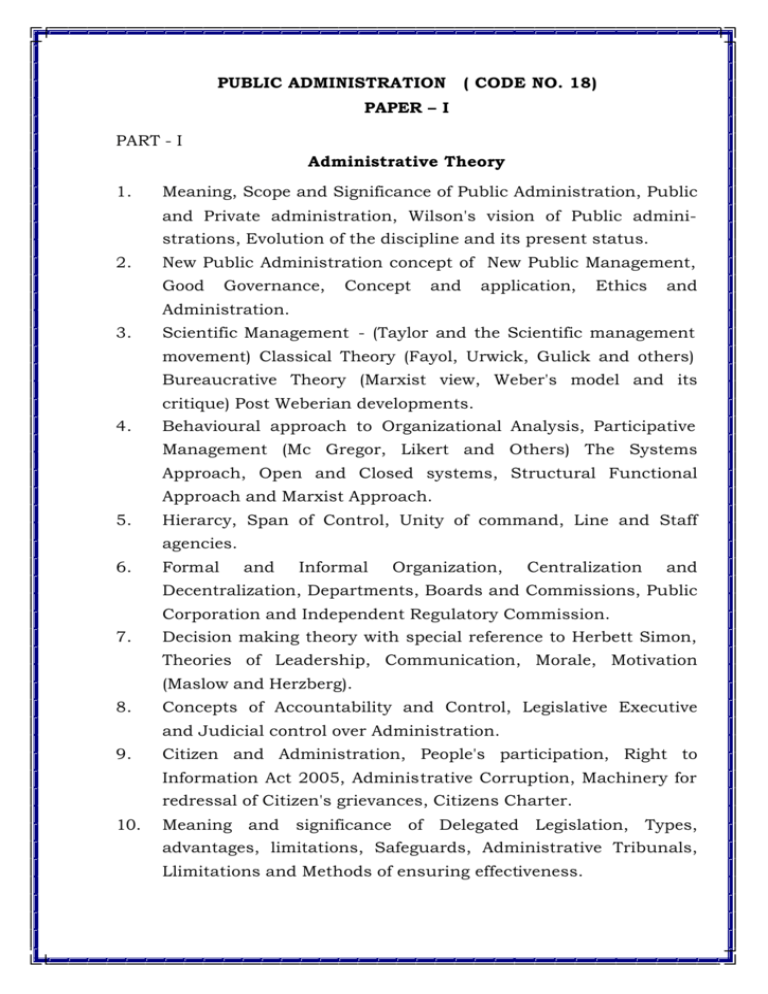
PUBLIC ADMINISTRATION ( CODE NO. 18) PAPER – I PART - I Administrative Theory 1. Meaning, Scope and Significance of Public Administration, Public and Private administration, Wilson's vision of Public administrations, Evolution of the discipline and its present status. 2. New Public Administration concept of New Public Management, Good Governance, Concept and application, Ethics and Administration. 3. Scientific Management - (Taylor and the Scientific management movement) Classical Theory (Fayol, Urwick, Gulick and others) Bureaucrative Theory (Marxist view, Weber's model and its critique) Post Weberian developments. 4. Behavioural approach to Organizational Analysis, Participative Management (Mc Gregor, Likert and Others) The Systems Approach, Open and Closed systems, Structural Functional Approach and Marxist Approach. 5. Hierarcy, Span of Control, Unity of command, Line and Staff agencies. 6. Formal and Informal Organization, Centralization and Decentralization, Departments, Boards and Commissions, Public Corporation and Independent Regulatory Commission. 7. Decision making theory with special reference to Herbett Simon, Theories of Leadership, Communication, Morale, Motivation (Maslow and Herzberg). 8. Concepts of Accountability and Control, Legislative Executive and Judicial control over Administration. 9. Citizen and Administration, People's participation, Right to Information Act 2005, Administrative Corruption, Machinery for redressal of Citizen's grievances, Citizens Charter. 10. Meaning and significance of Delegated Legislation, Types, advantages, limitations, Safeguards, Administrative Tribunals, Llimitations and Methods of ensuring effectiveness. PART - II 1. Meaning of Administrative Reforms. Process and obstacles Techniques of administrative reforms, O & M, Information technology (I.T.). 2. Management-meaning, Nature and significance, Tasks of management, POSDCORB. M.B.O. Tools of management and Test of Good Management. 3. Meaning, nature and scope of Comparative Public Administrtion, Bureaucracy and Ecology. 4. Origin and purpose of Development Administration, Rigg's Prasmatic - Sala model, Bureaucracy and Development, Changing profile of Development Administration. 5. Concepts of Leadership, Authority and Influence, Chief Executive and its role in Organisation. Concept of Bureaucracy, Weberian model and its relevance, Recruitment, Training, Promotion, Employer - Employee relations. 6. Grievances redressal mechanism, Integrity and Code of Conduct, Ombudsman, Lokpal and Lokayukta, Central Vigilance Commission. 7. Relevance of Policy making in Public Administration, Process of Policy formulation, Problems of implementation, Feedback and Evaluation. 8. Concept and significance of Financial Administration, Budget process and its role, Performance budgeting, Zero based Budget, Public debt. 9. Legislative Control - Public Account Committee., Estimate Committee, Public Undertaking Committee, Audit and Accounts, Comptroller and Auditor General of India. 10. Role of Computers in Public Administration, E governance. PUBLIC ADMINISTRATION PAPER – II (CODE NO. 18) PART - I Central, State and Local Administration India 1. Evolution of Indian Administration, Kautilya, Mughal period and British Legacy. 2. Indian Constitution, Development, Preamble and Main Characteristics, Parliamentary Democracy, Federal System and Centre - State Relations. 3. The President, Prime Minister, Council of Ministers, Cabinet and its Committees, P.M.O. Central Secretariat, Ministries and departments. 4. Advisory Bodies, Boards and Commission, National Human Rights Commission, UPSC, National Women Commission, Election Commission and Finance Commission. 5. Administrative Reforms, Reforms since independence, Reports of the Administrative reforms Commissions, Problems of their implementation. 6. Machinery of Planning, Composition and role, Planning Commission, Role of the National Development Council, Process of Plan formulation at Union and State levels, decentralized planning. 7. Role of Central and State Agencies in maintenance of law and order, Criminalisation of politics and administration. 8. Welfare Administration, Machinery for Welfare Administration at the National level. Special organizations for the welfare of the Scheduled Castes and scheduled Tribes, Welfare Schemes for Women and Children, Problems of Child labour. 9. Major issues in Indian Administrations, Problems of Centre State Relations, Values in Public Service and Administrative Culture, Development and Environmental issues. Indian Administration and Globalization. 10. Disaster management in India, Reservation policy in India, Women Empowerment, Role of NGOs in development. PART - II State Administration with special reference to Madhya Pradesh 1. Reorganisation of States (1956) - Formation of Madhya Pradesh, Separation of Chhatisgarh. 2. Relationship between Central and State Administration, Basic difference between Central and State Administ ration. 3. Governor, Chief Minister, Council of Ministers. 4. Chief Secretary, His role and functions, State Secretariat and Directorates, State Planning Board. 5. State Civil Services - Organization and functions of Madhya Pradesh Public Service Commission, Recruitment and Training. 6. Legislative and Financial control over Administration in M.P., Estimates Committee, Public Accounts Committees and Committee on Public undertaking. 7. Civil Services Tribunals, Tribal Administration in M.P., Lok Ayukta, Economic Offensive wing, Chief Information Commissioner. 8. District Administration - Role of Collector, Tehsil and Tehsildar, Blocks and B.D.O.'s. 9. Local Administration - Role of local government, Need of Decentralisation, administration Empowerment - Municipal of weaker corporations sections, and Urban Municipal Committees, and Nagar Pachayats in Madhya Pradesh. 10. Panchayati Raj in Madhya Pradesh - Three tier, System of Panchyati Raj Institutions - Zila Panchyat, Janpad Panchayat and Gram Panchayat, Role of Chief Executive Officer in Panchayat administration. Administration. State Control over local
